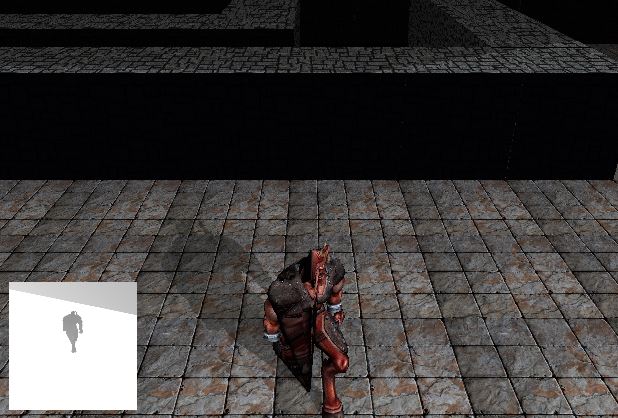I’ve got PARTIAL garbage geometry in my draw code when using vbo’s but not when using begin/end.
More simply, begin end works perfect, the vbo is mixed with trash, so I feel confident the data is good, but I’m missing something about the VBO. The VBO draws fine except for around face 5500 and later, which is (partially)corrupted (even when I dump the float to text, but not a problem if I draw with begin/end). I’ve tried different graphics cards/chips(AMD&Intel), so it is unlikely a specific graphics hardware issue/failure. (maybe the heap? but begin/end works fine with the same arrays so unlikely) I think its got something to do with the array(word size off the array or something?), but not the elements in the array. Again,Begin/End works fine.
//the good code
GLvoid renderTri(ACTOR *someActor)
{
glBegin(GL_TRIANGLES);
for (int f=0; f < someActor->FaceCnt;f++)
{
int vertai=someActor->faceIDarr[(f*3)+0];//face vert index a
int vertbi=someActor->faceIDarr[(f*3)+1];//face vert index b
int vertci=someActor->faceIDarr[(f*3)+2];//face vert index c
glMultiTexCoord2f(GL_TEXTURE0,someActor->uvcoords[(vertai*2)+0],someActor->uvcoords[(vertai*2)+1]);
glNormal3f(someActor->xyznorms[(vertai*3)+0],someActor->xyznorms[(vertai*3)+1],someActor->xyznorms[(vertai*3)+2]);
glVertex3f(someActor->xyzverts[(vertai*3)+0],someActor->xyzverts[(vertai*3)+1],someActor->xyzverts[(vertai*3)+2]);
glMultiTexCoord2f(GL_TEXTURE0,someActor->uvcoords[(vertbi*2)+0],someActor->uvcoords[(vertbi*2)+1]);
glNormal3f(someActor->xyznorms[(vertbi*3)+0],someActor->xyznorms[(vertbi*3)+1],someActor->xyznorms[(vertbi*3)+2]);
glVertex3f(someActor->xyzverts[(vertbi*3)+0],someActor->xyzverts[(vertbi*3)+1],someActor->xyzverts[(vertbi*3)+2]);
glMultiTexCoord2f(GL_TEXTURE0,someActor->uvcoords[(vertci*2)+0],someActor->uvcoords[(vertci*2)+1]);
glNormal3f(someActor->xyznorms[(vertci*3)+0],someActor->xyznorms[(vertci*3)+1],someActor->xyznorms[(vertci*3)+2]);
glVertex3f(someActor->xyzverts[(vertci*3)+0],someActor->xyzverts[(vertci*3)+1],someActor->xyzverts[(vertci*3)+2]);
}
glEnd();
}
//no worky good
GLvoid renderVBO(ACTOR *someActor)
{
glEnableClientState(GL_VERTEX_ARRAY); // activate vertex position array
glEnableClientState(GL_NORMAL_ARRAY); // activate vertex normal array
glEnableClientState(GL_TEXTURE_COORD_ARRAY); // activate texture coord array
if (builtVBO==0) //befor first draw create the vbos
{
builtVBO+=1;
glGenBuffers(1, &someActor->xyzID);
glBindBuffer(GL_ARRAY_BUFFER, someActor->xyzID);
glBufferData(GL_ARRAY_BUFFER, 3*sizeof(GLfloat)*someActor->VertCnt, 0,GL_STATIC_DRAW);
glBufferSubData(GL_ARRAY_BUFFER, 0, 3*sizeof(GLfloat)*someActor->VertCnt, someActor->xyzverts);
glBindBuffer(GL_ARRAY_BUFFER, 0);
glGenBuffers(1, &someActor->xyznID);
glBindBuffer(GL_ARRAY_BUFFER, someActor->xyznID);
glBufferData(GL_ARRAY_BUFFER, 3*sizeof(GLfloat)*someActor->VertCnt, 0,GL_STATIC_DRAW);
glBufferSubData(GL_ARRAY_BUFFER, 0, 3*sizeof(GLfloat)*someActor->VertCnt, someActor->xyznorms);
glBindBuffer(GL_ARRAY_BUFFER, 0);
glGenBuffers(1, &someActor->uvID);
glBindBuffer(GL_ARRAY_BUFFER, someActor->uvID);
glBufferData(GL_ARRAY_BUFFER, 2*sizeof(GLfloat)*someActor->VertCnt, 0,GL_STATIC_DRAW);
glBufferSubData(GL_ARRAY_BUFFER, 0, 2*sizeof(GLfloat)*someActor->VertCnt, someActor->uvcoords);
glBindBuffer(GL_ARRAY_BUFFER, 0);
glGenBuffers(1, &someActor->faceID);
glBindBuffer(GL_ELEMENT_ARRAY_BUFFER, someActor->faceID);
glBufferData(GL_ELEMENT_ARRAY_BUFFER, sizeof(GLuint)*someActor->FaceCnt*3, someActor->faceIDarr, GL_STATIC_DRAW);
}
glBindBuffer(GL_ARRAY_BUFFER, 0);
glBindBuffer(GL_ARRAY_BUFFER, someActor->xyzID);
glVertexPointer(3, GL_FLOAT, 0, 0);
glBindBuffer(GL_ARRAY_BUFFER, someActor->xyznID);
glNormalPointer(GL_FLOAT, 0, 0);
glBindBuffer(GL_ARRAY_BUFFER, someActor->uvID);
glTexCoordPointer(2, GL_FLOAT, 0, 0);
glBindBuffer(GL_ELEMENT_ARRAY_BUFFER, 0);
glBindBuffer(GL_ELEMENT_ARRAY_BUFFER, someActor->faceID);
glDrawElements(GL_TRIANGLES, someActor->FaceCnt*3, GL_UNSIGNED_INT, 0);//BUFFER_OFFSET(0));
glDisableClientState(GL_VERTEX_ARRAY);
glDisableClientState(GL_NORMAL_ARRAY);
glDisableClientState(GL_TEXTURE_COORD_ARRAY);
}
